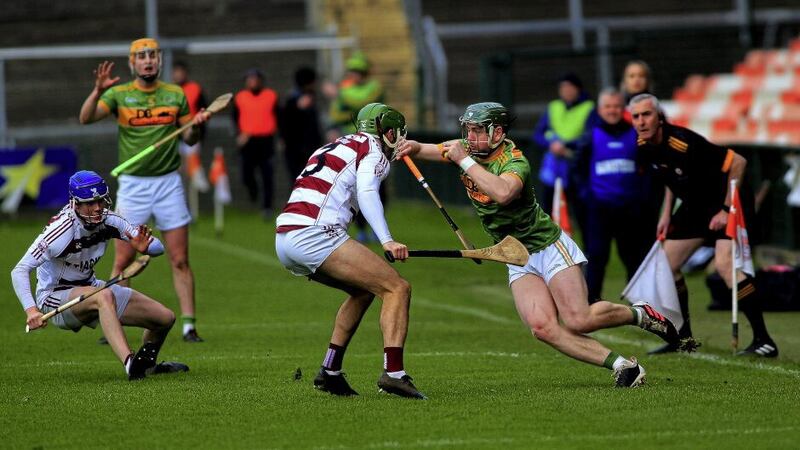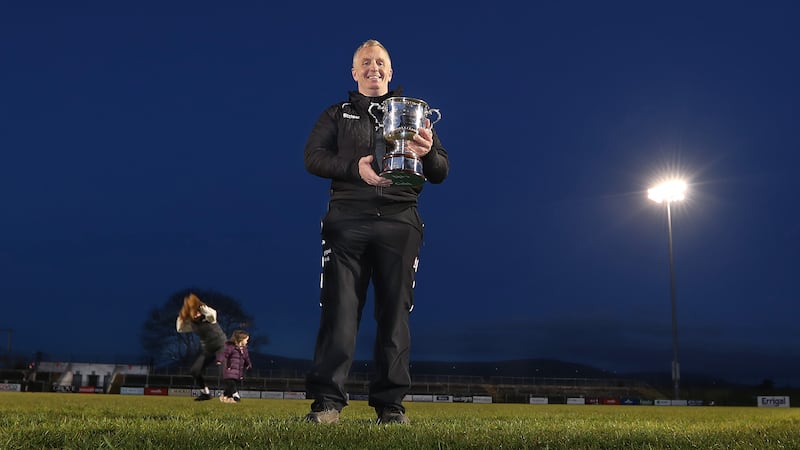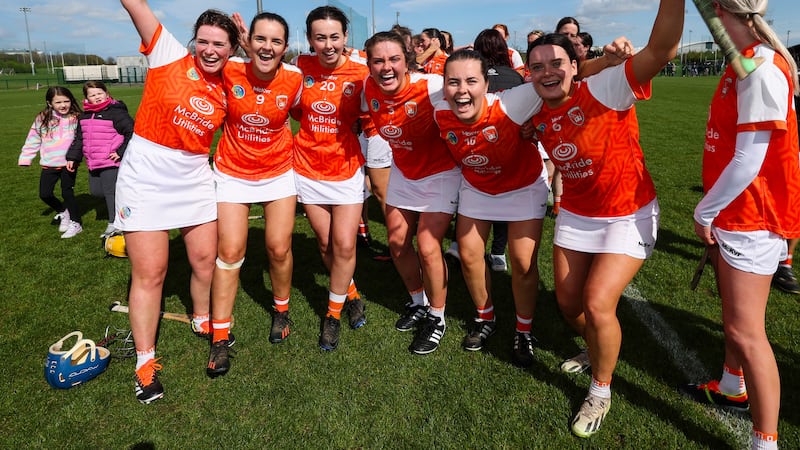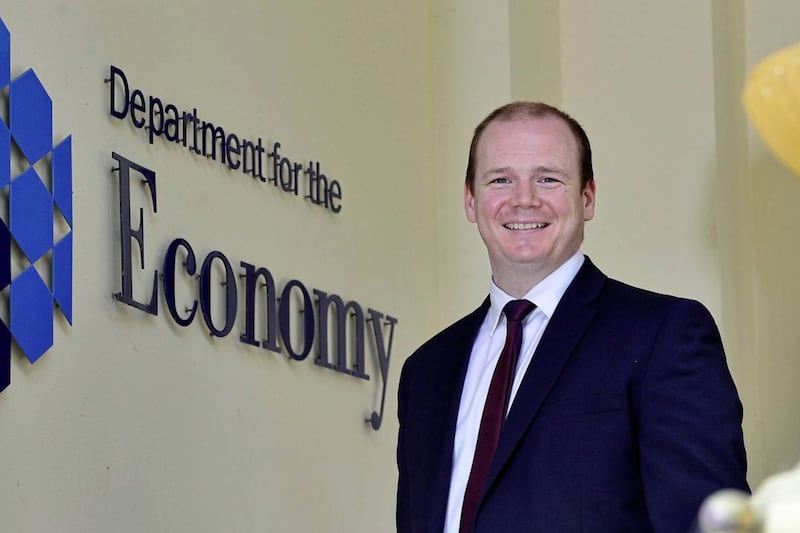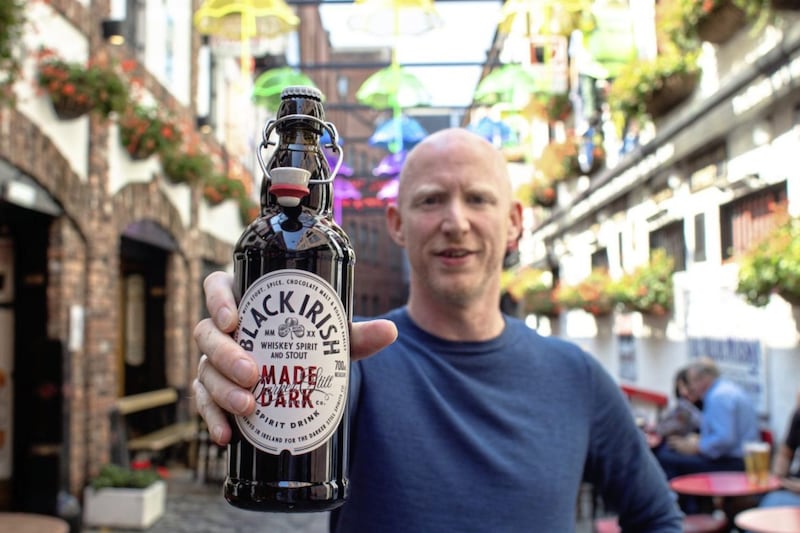One of the many consequences of the shuttering of Casement Park is that the Athletic Grounds has taken over, temporarily at least, as a home of Ulster club hurling.
Crunching set-piece battles for the Four Seasons Cup have taken place across the province but the most memorable broke out under grey Armagh city skies as late autumn ran into early winter.
It’s strange how quickly a scene once considered a novelty becomes not just accepted but familiar then expected.
When Casement Park rises into its long overdue modern, light-up amphitheatre on the footprint of the old ground, Ulster will decide its ultimate squabbles there.
The Athletic Grounds connection will pass into memory – but not just yet.
That it will stand as an era of Ulster hurling and not just an interlude is because of Slaughtneil.
For the first 45 years of the Ulster club championship Antrim and the occasional Down interloper kept it a private party. The odd Derry team raised a scare but it wasn’t until Slaughtneil arrived, and arrived at the Athletic Grounds to claim their first provincial title in 2015, that everything changed.
From novelty to familiar to expected.
And under concrete skies on the first Sunday of December they were expected, again, to do what they by now always do.
They were defending a title they had won not in Armagh but at Corrigan Park, against Ballycran a little under 12 months previously. But they had beaten Dunloy at the Athletic Grounds to get there. And, after securing a third Antrim title in-a-row, Dunloy were back again.
Even this Slaughtneil team had to lose a couple in Ulster before they won one – to recent All-Ireland champions Loughgiel heavily in 2012 and All-Ireland finalists Cushendall by the skin of their extra-time teeth two years later.
This Dunloy team have had to lose a few as well, and they’ve lost them all to Slaughtneil.
Before running into them in 2017, Cuchullain’s possessed a remarkable record. They’d never lost a match in the Ulster championship. 10 competitions played, 10 won.
After that 2017 semi-final defeat at Owenbeg Dunloy entered Ulster competition twice more and lost to Slaughtneil both times.
While getting out of Antrim previously meant one thing for Dunloy – an Ulster title – for this generation that one thing has been defeat to Slaughtneil.
The one time Slaughtneil were caught between their first title in 2016 and this year was in the 2018 semi-final against Ballycran when it felt like something had to give. Football exertions that had seen them come close to an All-Ireland title were taking their toll.
“We’ve been slogging our guts out for four years,” said manager Michael McShane after that Ballycran loss.
Since then they’ve retained their Derry hurling crowns while not winning the football again. Still slogging their guts out, that much is obvious, but with one provincial focus and they picked up both Ulster hurling championships, beating Dunloy along the way, played since then.
This season, a simple semi-final tune-up win over Down champions Portaferry, who regained the title Ballycran had taken from them the previous year, led Slaughtneil into a final they were fancied to win again.
But from the throw-in at the Athletic Grounds Dunloy looked a little different. Kevin Molloy hit Shea Cassidy with a shoulder that could be felt from the edge of the Glens to the foothills of the Sperrins.
It was scrappy, tense, tight and completely absorbing as Dunloy stood up and managed to get onto the right side of enough of the exchanges. For once, Slaughtneil were left feeling that they’d let one slip.
After half a decade of trying, Dunloy had finally shaken free of Slaughtneil and headed to another theatre of broken dreams – Croke Park.
Even with the expanded junior and intermediate competitions, most clubs will never get to Jones’s Road.
Neither Ulster’s junior nor intermediate representatives managed it this year, either for the 2021-’22 season or the current one.
In January, Armagh’s Craobh Rua lost out after extra-time and penalties to Manchester club Fullen Gaels in what was effectively an All-Ireland quarter-final, while Banagher from Derry were defeated by Kerry senior champions Kilmoyley in the intermediate semi.
This season, Setanta had a second crack at it after beating Antrim junior champions Glenarm to repeat their 2017 Ulster title win but the Donegal senior champions lost to London side Kilburn Gaels at the same stage as Craobh Rua.
Liatroim, who lost three successive Ulster intermediate finals in the early years of the competition, finally became the first Down club to win it, beating Armagh senior champions Middletown. Getting to Croke Park proved a step too far for the Fontenoys, who left themselves too much to do against Mayo senior kingpins Tooreen, eventually losing by four points in their All-Ireland semi-final.
For all their greatness over recent years, Slaughtneil’s men have only managed to get to Headquarters with footballs in their hands.
They missed out again at the start of the year when they lost to eventual champions Ballygunner in the All-Ireland senior semi-final.
Before this year’s visit for the All-Ireland semi against St Thomas’s Dunloy could count six trips to GAA headquarters with just one win to show for it. That was another semi-final, against Glenmore in 1996, with a draw in their first All-Ireland final against Birr the previous year. The replay ended in heavy defeat, the same as deciders in 1996, 2003 and 2004.
That Glenmore win was Dunloy’s most impressive on the All-Ireland stage – a 13-point thumping of the Kilkenny champions. They only beat St Thomas’ by three points the week before Christmas but their display was every bit as dominant as the one so many of their fathers and uncles – and their manager Gregory O’Kane – produced against Glenmore.
They won by four points but between missed chances, including a penalty, and some questionable officiating they should have been double figures better than their Galway opponents.
That’s a warning for what’s ahead of them in the final, where Ballyhale will be another level of challenge and every opportunity, however small, will need to be taken.
But as old rivals Slaughtneil showed for so much of their 2020 semi-final against the Kilkenny giants, nothing is impossible. Being within striking distance until the finals seconds won’t be enough for Dunloy but they can take some inspiration from their nemesis, who’ll be watching – if they can bear it – no doubt thinking they should be an hour away from an All-Ireland title.
Roll on Dunloy’s final and whatever happens at the Athletic Grounds next year. If 2022 did anything it set 2023 up to be a year to savour in Ulster club hurling.
